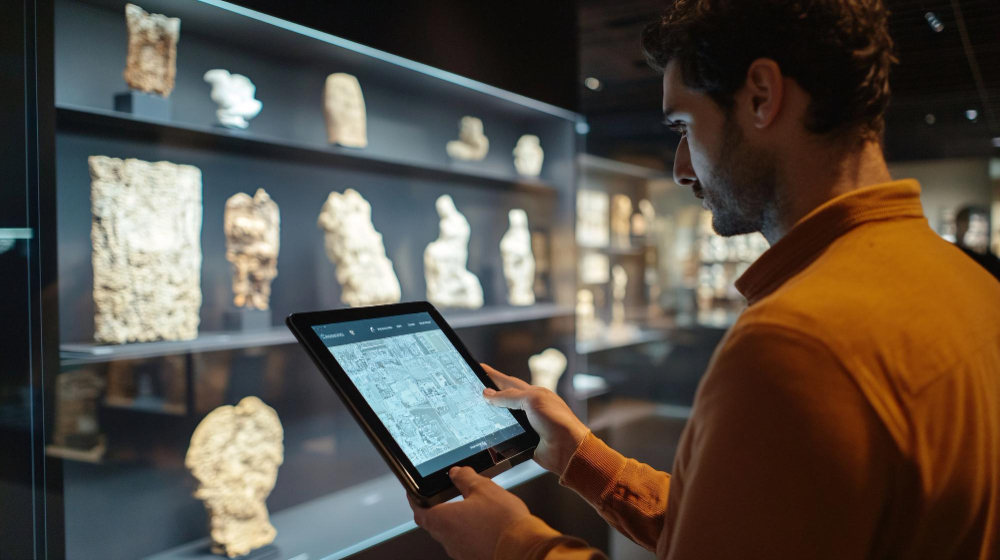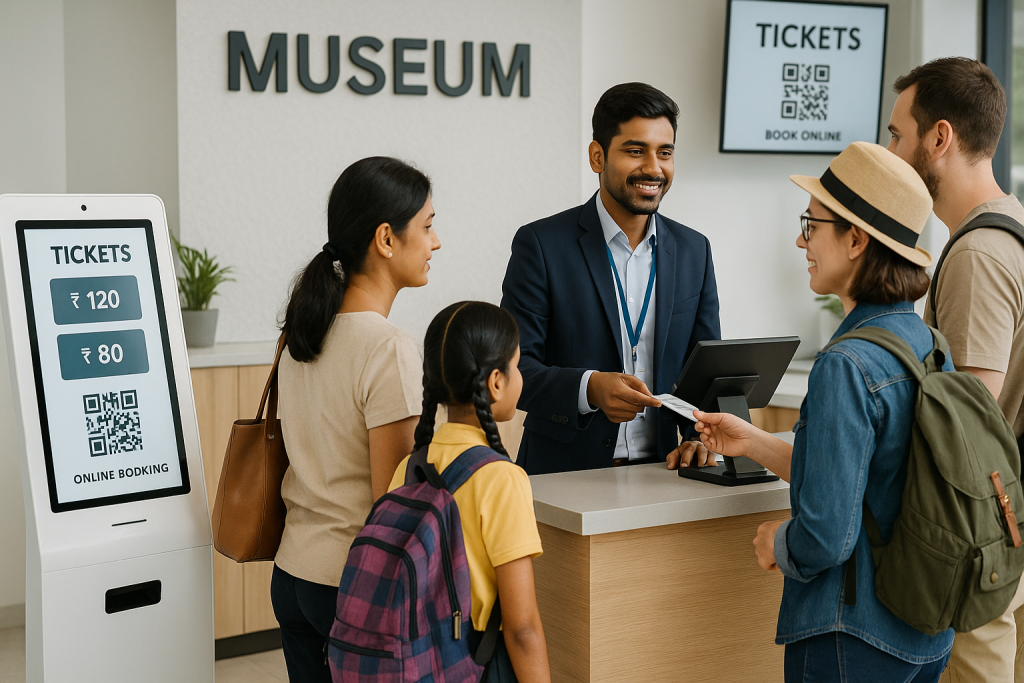Museum digitization benefits are being overshadowed by a sea of outdated management practices. Imagine spending hours manually tracking artifacts, wrestling with paper-based ticketing systems, and struggling to engage modern visitors who crave interactive, technology-driven experiences. The traditional museum model is crumbling under the weight of its own inefficiency.
The pain is real: visitor numbers are declining, operational costs are skyrocketing, and cultural institutions are at risk of becoming irrelevant in a digital-first world. Museums lose an estimated 15-20% of potential revenue due to inefficient ticketing and management systems, while 75% of younger audiences demand more digital interaction with cultural content.
The digital transformation isn’t just an option—it’s a lifeline. Museums that embrace technological innovation can unlock unprecedented opportunities: increased visitor engagement, streamlined operations, and new revenue streams. With the global museum management software market projected to reach $2.5 billion by 2028, the future belongs to institutions bold enough to reimagine their approach to cultural preservation and visitor experience.
Digitization is the key to survival, transformation, and renewed relevance in the 21st century.
Current State of Museum Operations
Museums have long been guardians of cultural memory, meticulously preserving artifacts and sharing historical narratives. However, traditional management approaches have increasingly become inadequate in our fast-paced, technology-driven world. Manual processes of ticketing, visitor management, collection tracking, and visitor engagement have created significant bottlenecks that limit a museum’s potential to connect with modern audiences.
Imagine a scenario where museum staff spend hours manually logging artifact details, managing paper tickets, and struggling with complex inventory systems. These time-consuming tasks not only drain resources but also create barriers to providing exceptional visitor experiences. The limitations of traditional methods have become glaringly apparent, signaling an urgent need for comprehensive digital transformation.
Key Areas of Digital Transformation
Digital transformation in museums is a holistic approach that reimagines every aspect of museum operations through technological innovation. It’s not about replacing human expertise but enhancing it through smart, integrated digital solutions that streamline processes, expand reach, and create more engaging visitor experiences.
Modern museum management now encompasses a comprehensive digital ecosystem that touches every facet of institutional functioning. Digital ticketing systems have revolutionized visitor access, allowing seamless online bookings, real-time capacity management, and personalized entry experiences. Collection management has transformed from manual cataloging to sophisticated digital archives where every artifact can be meticulously documented, tracked, and researched with unprecedented ease.
Visitor experiences have been dramatically enhanced through interactive digital exhibits, augmented reality installations, and mobile applications that provide multilingual, personalized guided tours. Museums can now offer immersive experiences that go far beyond traditional walk-through exhibitions. Imagine standing in front of an ancient artifact and using your smartphone to see detailed historical context, watch recreations of its creation, or explore its cultural significance through rich multimedia content.
Operational efficiency has seen remarkable improvements through digital technologies. Advanced management software enables precise inventory tracking, optimized resource allocation, and data-driven decision-making. Machine learning algorithms can predict visitor trends, help in conservation planning, and even suggest optimal exhibition layouts. These technological interventions not only reduce operational costs but also provide insights that were previously impossible to obtain.
Technology Solutions for Museums
The market for museum management technology has exploded in recent years, offering a wide array of sophisticated solutions tailored to cultural institutions’ unique needs. Cloud-based platforms now provide comprehensive management tools that integrate ticketing, collection management, visitor analytics, and operational planning into unified systems.
These technological solutions are not one-size-fits-all but can be customized to meet specific institutional requirements. From small local museums to large national institutions, digital transformation strategies can be scaled and adapted. The key lies in selecting the right mix of technologies that align with an organization’s goals, budget, and technological readiness.
Security remains a paramount concern in digital transformation. Modern museum management software incorporates robust cybersecurity measures to protect sensitive artifact information, visitor data, and institutional records. Advanced encryption, multi-factor authentication, and regular security audits ensure that digital innovation doesn’t compromise data integrity.
Implementation Strategies
Successfully implementing digital transformation requires a strategic and thoughtful approach. Museums must first conduct a comprehensive assessment of their current technological infrastructure and organizational readiness. This involves creating a detailed digital maturity assessment that examines existing systems, staff capabilities, and technological gaps.
A phased digital transformation approach is crucial for sustainable change. Museums should start with pilot projects that demonstrate immediate value, such as implementing a digital ticketing system or creating a basic digital collection management platform. Staff training becomes paramount during this process. It’s not enough to simply introduce new technologies; institutions must invest in comprehensive training programs that build digital literacy and confidence among team members.
Budget considerations play a critical role in digital transformation. While initial investments might seem substantial, the long-term return on investment is significant. Museums need to develop a clear financial strategy that balances technology investments with expected operational efficiencies, increased visitor engagement, and potential new revenue streams.
Future Trends in Museum Digitization
The future of museum management is incredibly exciting, with emerging technologies promising to revolutionize how cultural heritage is preserved and experienced. Artificial intelligence is set to play a transformative role, offering advanced predictive conservation techniques, personalized visitor recommendations, and sophisticated data analysis capabilities.
Virtual and augmented reality technologies will continue to break down geographical barriers. Museums will be able to offer immersive experiences that allow people from around the world to explore collections without physical limitations. Imagine a scenario where a student in rural India can take a detailed virtual tour of the Louvre, experiencing artifacts with unprecedented depth and interactivity.
Blockchain technology is emerging as a promising solution for artifact provenance and digital rights management. This technology can provide unprecedented transparency in collection history, authentication, and digital preservation. Machine learning algorithms will become more sophisticated in predicting conservation needs, visitor preferences, and exhibition design.
The Internet of Things (IoT) will enable more interactive and responsive museum environments. Smart sensors could adjust lighting, temperature, and exhibition layouts in real-time based on visitor interactions and conservation requirements. Personalization will reach new heights, with museums able to craft truly individualized visitor experiences.
Conclusion
Digital transformation is no longer an option but a necessity for museums in the 21st century. Institutions that embrace technological innovation will not only survive but thrive in an increasingly digital world. The journey of digital transformation is about more than just implementing new technologies—it’s about reimagining the very essence of how cultural heritage is preserved, shared, and experienced.
Museums stand at a unique intersection of historical preservation and technological innovation. By leveraging digital tools, they can ensure that cultural narratives remain vibrant, accessible, and engaging for current and future generations. The museums of tomorrow will be dynamic, interactive spaces that break down traditional barriers and create meaningful connections between artifacts, visitors, and global cultural heritage.
About Everyticket
Everyticket is at the forefront of digital transformation for cultural institutions. Our comprehensive digital solutions are designed to help museums navigate the complex landscape of technological innovation. We understand that each institution is unique, which is why we offer customized digital transformation strategies that align with your specific needs and goals.
Our team of experts specializes in providing cutting-edge ticketing solutions, collection management systems, and digital engagement tools. We’re not just a technology provider; we’re a strategic partner committed to helping museums unlock their full potential in the digital age.
Ready to transform your museum’s digital landscape? Contact Everyticket.in today for a comprehensive consultation and take the first step towards a more innovative, accessible, and engaging future.



